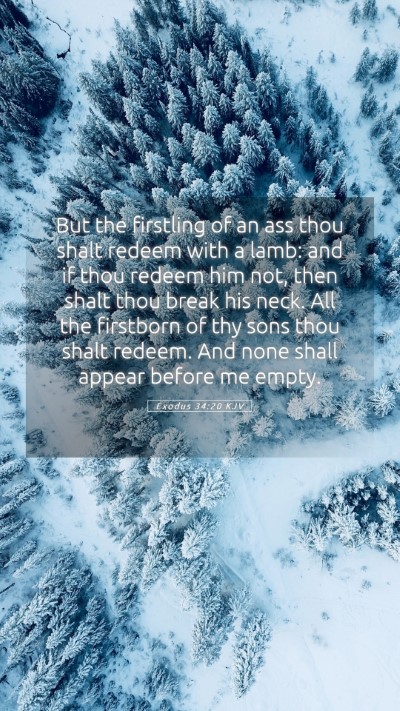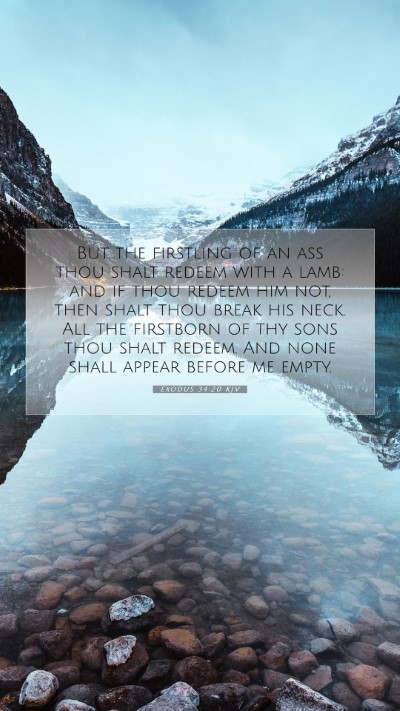Exodus 34:20 - Meaning and Explanation
Exodus 34:20 states: "But the firstling of an ass thou shalt redeem with a lamb: and if thou redeem him not, then shalt thou break his neck. All the firstborn of thy sons thou shalt redeem. And none shall appear before me empty." This verse holds significant meaning within biblical scripture, particularly in understanding the laws regarding the firstborn and the responsibilities that came with them.
The teachings derived from this verse can be analyzed through various public domain commentaries, including those by Matthew Henry, Albert Barnes, and Adam Clarke, offering deep insights into its theological and practical implications.
Context and Overview
In this section, we explore the contextual background and implications of Exodus 34:20:
- Historical Context: The verse is situated within God's detailed instructions to Moses regarding worship and sacrifices. At this time, God's covenant with Israel was being reaffirmed.
- Significance of the Firstborn: The firstborn son represents a vital aspect of the family and society within Israelite culture, signifying strength, inheritance, and divine privilege.
- Symbolism: The practices surrounding the firstborn reflect deeper scriptural themes of redemption and sacrifice that would culminate in New Testament meanings.
Commentary Insights
Matthew Henry's Commentary
Henry discusses the implications of redeeming the firstborn of the ass with a lamb, emphasizing the significance of sacrificial offerings as a means of atonement and devotion to God. He notes that failure to redeem results in the loss of the animal, which teaches us about the seriousness of adhering to God’s commands.
Albert Barnes' Commentary
Barnes interprets this verse as underscoring the idea that God desires a relationship that involves obedience and acknowledgment of His sovereignty. He also points out the foreshadowing of Christ as the ultimate sacrifice, representing the lamb that redeems all firstborns, both of animals and humanity.
Adam Clarke's Commentary
Clarke elaborates on the practical applications of this verse, suggesting that it serves to remind believers of their spiritual obligations. He asserts that these laws were vital in establishing a continual recognition of God’s providence and the necessity of redemption.
Key Themes
- Redemption: The idea that something must be sacrificed to redeem another carries throughout the Scripture, signifying God's plan for salvation through Jesus Christ.
- Obedience: This verse illustrates the importance of obedience to God’s commandments and the consequences of neglecting them.
- Divine Providence: Recognizing God as the ultimate provider reflects an underlying theme of reliance on His grace and mercy.
Applications for Today
In applying Exodus 34:20 to contemporary life, several key points emerge:
- Understanding Sacrifice: Just as the Israelites were to redeem their firstborns, believers today are encouraged to recognize the importance of sacrifice in their spiritual lives.
- Commitment to God: The command to not appear before God empty suggests that individuals should come prepared to worship, reflecting their commitment to Him.
- Living in Obedience: This verse serves as a reminder to live in accordance with God’s laws and a call to reinforce one’s faith through action.
Related Scripture References
For further study and understanding of Exodus 34:20, consider the following cross-references:
- Exodus 13:12-15: Discusses the consecration of the firstborn.
- Leviticus 27:26-27: Further elaborates on redeeming livestock.
- Luke 2:23: References the dedication of Jesus as the firstborn.
Conclusion
Exodus 34:20 encapsulates profound theological meanings relevant to both ancient and modern believers. Through rich commentary and interpretation, one can better understand the significance of this verse and its implications for biblical study and daily living. Engaging with scripture through these insights fosters deeper understanding and application of biblical principles.


